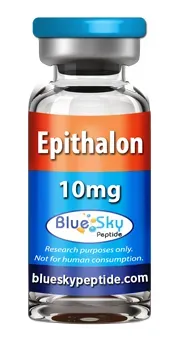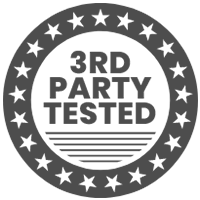45% Off Everything*
Save Now!!

Availability: In stock

| Unit Size | 10 mg/ vial | Unit Quantity | 1 vial |
| Purity (Mass Spectrometry and UV) | 96.8% |
| Sequence | H-Ala-Glu-Asp-Gly-OH |
| Molecular Formula | C14H22N4O9 |
| Molecular Weight | 390.1 |
| Appearance | lyophilized White Powder |
| Source | Chemical Synthesis |
| Storage |
Epithalon 10mg is Stable at room Temperature for 90 days, however it is best to store in a freezer below - 8c for any extended period of time. After reconstitution Epithalon 10mg should be refrigerated at temperatures not to exceed 35 F. |
| Terms | The products we offer are intended for laboratory research use only. Please familiarize yourself with our terms of service prior to ordering. |
Epithalon peptide is a synthetic peptide mimetic of the naturally-produced protein epithalamin. Epithalon (also known as epitalon) is a short peptide consisting of just 4 amino acids — alanine, glutamic acid, asparagine, and glycine, and it has a molecular mass of just 390 g/mol. Epithalamin is produced by the pineal gland in the brain and is responsible for regulating circadian rhythm and releasing melatonin.1 Epithalamon is known to have several functions in animal models, including increasing melatonin production from the pineal gland in response to light-dark signals, exhibiting anti-inflammatory and antioxidant effects, improving immunological parameters, and having anticarcinogenic effects.2 Many studies highlight the peptide’s ability to improve the lifespan of several animal models, including fruit flies, mice, and rats.1,2 Also known as the AEDG peptide (named after its amino acids) epithalon has been studied for its ability to upregulate the enzyme telomerase, which has anti-aging and anti-tumorigenic effects.3 In vitro studies of epithalon show that it can take human fibroblast cell lines past the Hayflick limit, or the number of times a cell can divide before going into senescence. One report found that epithalon-treated cells could be passaged over 44 times, while control cells were only passaged 34 times.4 In vivo studies using mouse models of aging found that epithalon treatment also reduces chromosomal abnormalities, both in wild-type mice and those with an accelerated aging phenotype.5 Epithalon has also been studied in the context of fighting free radicals involved with aging. Another in vivo study using aging rats found that treatment with epithalon boosted the antioxidant activity of several enzymes, including glutathione-S-transferase, superoxide dismutase, and glutathione peroxidase.6
Epithalon comes as a lyophilized white powder at 10 mg in a vial.
References: 1 Khavinson V, Diomede F, Mironova E, Linkova N, et al. AEGD Peptide (Epitalon) Stimulates Gene Expression and Protein Synthesis during Neurogenesis: Possible Epigenetic Mechanism. Molecules. 2020 Feb;25(3):609. 2. Khavinson V. Peptides and Ageing. Neuro Endocrinol Lett. 2022;23 Suppl 3:11-144. 3. Khavinson VK, Bondarev IE, Butyugov AA. Epithalon peptide induces telomerase activity and telomere elongation in human somatic cells. Bull Exp Biol Med. 2003 Jun;135(6):590-2. 4. Khavinson VK, Bondarev IE, Butyugov AA, Smirnova TD. Peptide promotes overcoming of the division limit in human somatic cell. Bull Exp Biol Med. 2004 May;137(5):503-6. 5. Rosenfeld SV, Togo EF, Mikheev VS, Popovich IG, et al. Effect of epithalon on the incidence of chromosome aberrations in senescence-accelerated mice. Bull Exp Biol Med. 2002 Mar;133(3):274-6. 6. Kozina LS, Arutjunyan AV, Khavinson VK. Antioxidant properties of geroprotective peptides of the pineal gland. Arch Gerontol Geriatr. 2007;44 Suppl 1:213-6.